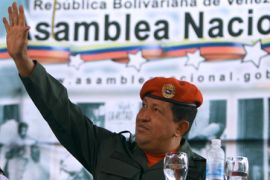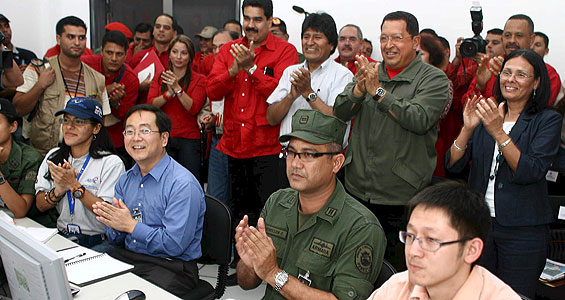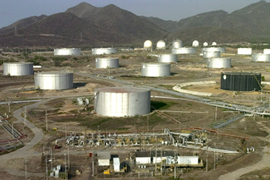Chavez’s ‘historic’ China strategy
Beijing is using technology transfer to help Caracas become a Latin American power.

 |
| At a land base in Venezuela, Chavez and Morales cheer the satellite’s successful launch [EPA] |
As the rocket carrying the Simon Bolivar Venesat-1 satellite lifted into space from south-western China, Hugo Chavez, the Venezuelan president, could not help but show his excitement.
Watching the launch live from Bolivar State, in south-eastern Venezuela, with Evo Morales, the Bolivian president, Chavez described the October 2008 launch of the country’s first satellite “of strategic and historical importance for Venezuela and China”.
| special report | |
Your Views: Is China buying the world? |
The satellite is now used by Venezuela to meet some of its telecommunication needs and is one of the main achievements of Caracas’ strategic partnership with Beijing.
Keep reading
list of 4 itemsUS House approves aid package worth billions for Ukraine, Israel
Ecuador weighs security, international arbitration in latest referendum
‘Triple spending’: Zimbabweans bear cost of changing to new ZiG currency
Venezuela’s interest in such a partnership provided China an excellent opportunity as it searched for a reliable partner that could guarantee energy, particularly oil, supplies in the long run.
Their relationship now stretches from the depths of space to Venezuelan soil.
Developing oil fields
In central Venezuela’s Faja del Orinoco, believed to be the world’s largest oil reserve, China is helping Caracas explore an area that is believed to hold about 40 billion barrels of crude oil, twice the volume of oil reserves in the US.
As Venezuela seeks to diversify and expand the reach of its energy exports in the world instead of largely depending on US markets, it has started exporting oil for the first time in recent years to far-away China.
It currently exports to China almost 400,000 barrels a day and hopes to reach 1mn barrels by 2010. It is also planning to build refineries in China.
In the meantime, China is also helping Venezuela develop its telecommunications and hi-tech infrastructure.
In the Paraguana Peninsula in western Venezuela, China has helped Venezuela manufacture its first mobile phone and computer.
“Best” mobile phone
 |
| Chavez wants to use Venezuela’s oil to break what he believes is US hegemony [EPA] |
Baptised the Vergatario, or in colloquial Spanish “the very best”, the new mobile phone is assembled in a joint Chinese and Venezuelan company called VTELCA.
Chinese engineers have contributed the technology and parts while Venezuela provides the manual labour, infrastructure and financing.
The Vergatario costs a mere $14, the cheapest by far in the market, and is intended to cater to low-income Venezuelans.
The phone was released for the first time on Mother’s Day in May earlier this year. Within hours all units were sold out and many Venezuelans are waiting for the next batch to come out.
Technological sovereignty
VTELCA is one of 209 new socialist companies that have been established to help Venezuela reach what Chavez has termed ‘national technological sovereignty’.
Most of its 170 workers were hired through local “communal councils” in the area’s towns and villages. Comprised of housewives and labourers, the workforce was trained by the Chinese who now only supervise the work in the factory.
In one such factory, which began operating in December 2006, Chinese engineers are helping Venezuelans develop the first homemade computer.
Venezuelans hope Chinese technology and know-how will be transferred to them in the future so they can design their own computers and locally manufacture the parts in future socialist companies.
Joint investments
In 2007, China and Venezuela established a joint investment fund in which China initially pledged to inject $4bn over a period of three years. Venezuela provided $2bn into the fund.
The idea behind the fund is that the Chinese contribution would be a down payment for future oil supplies, while Venezuela would use the money in development projects.
The two would agree on a fixed oil price in a way that protects both from constant fluctuations in the energy market.
Less than two years later, China had already provided its share. In early 2009, at the height of the current global financial crisis, Chavez managed to convince Beijing to add an extra $4bn to the fund; Caracas also injected a further $2bn raising the total value to $12bn.
This is one of the Chavez government’s many alternatives to conventional financing by the IMF and World Bank. These funds are designed to finance development projects without the burden of high interest rates and without dictating economic policies by the lender.
It is also a mechanism to break the circle of speculation in the energy market which Chavez believes is based on “capitalist principles” and he calls as “unfair and greedy”.
The fund has been used to finance many projects in Venezuela so far. In one project in the state of Monagas in eastern Venezuela, the fund is financing a pilot project to increase chicken production in the country using Argentinian know-how.
It has also been used to finance a nationwide railway network that is being built in a partnership with other countries.
Ideology and strategy
When Chavez came to power 10 years ago, trade with China had peaked under $200mn but since then it has jumped to nearly $10bn.
It is no surprise then that Chinese officials say that Venezuela has now become the biggest recipient of its investments in Latin America.
While the Chinese community has existed here for decades, the presence of Chinese companies is increasing and being felt in several sectors of the economy: housing, agriculture, industry. The relationship serves China’s commercial interests.
But for Venezuela, it serves ideological and strategic purposes.
Since becoming president, Chavez has travelled to China six times, making him its most frequent visitor among Latin American leaders.
He says the growing ties with Beijing are part of his stated aim to build a new multi-polar model of international relations “to break” US hegemony.
He has also embarked on a programme of cultural and scientific exchange with China.
By having Venezuelans study and benefit from Chinese technological expertise, Chavez is hoping to create a strategic partnership which merges China’s socio-economic experiment with Latin American socialism.
